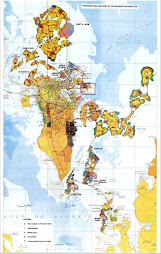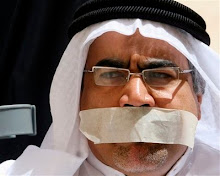CPJ concerned about Bahrain Web crackdown
April 7, 2009
His Majesty Sheikh Hamad bin Isa Al Khalifa
King of Bahrain
C/o The Embassy of the Kingdom of Bahrain
International Drive, NW Washington, D.C. 20008
Via facsimile: 202-362-2192
Your Majesty,
The Committee to Protect Journalists is writing to protest the recent deterioration of press freedom in Bahrain and your government's ongoing campaign against critical or opposition Web sites and blogs. The crackdown against those sites has resulted in dozens of them being blocked inside the kingdom, according to local and international human rights and press freedom watchdogs.
CPJ is concerned about a campaign targeting independent or critical Web sites that discuss social, political, and human rights issues, especially with the backdrop of an escalating crackdown on Shi'a activists, opposition figures, and human rights defenders. In January, local media outlets published ministerial order 1/2009, issued by Culture and Information Minister Sheikha Mai bint Muhammad Al Khalifa, ordering telecommunications companies to block specific Web sites without warning or providing specific reasons when ordered to by the ministry. Dozens of blogs, discussion forums, and sites of local and regional human rights groups have been blocked since.
Authorities have described their campaign as one against pornographic and socially inappropriate Web sites, but CPJ research reveals that the sites of dozens of human rights groups, opposition or independent bloggers, and political organizations have been blocked inside Bahrain. Article 2 of the order states that "all telecommunications companies and Internet service providers must block Web sites that are pornographic or violate public decency," but Article 1 compels those companies to block Web sites on order from the minister, presumably even if they are not of a pornographic nature.
Freedom of expression advocates have argued that before this order was issued, Web sites and blogs that the government deemed troublesome were blocked anyway. But multiple sources told CPJ that the number of blocked sites has risen exponentially as of late. The Ministry of Culture and Information is using advanced technology that can filter keywords and block sites, multiple sources inside Bahrain told CPJ. Blocked sites feature a screen that reads: "This Web site has been blocked for violating regulations and laws of the Kingdom of Bahrain."
On February 11, the Ministry of Culture and Information told Reuters that some Web sites had been blocked because of technical problems and that this would be resolved. But many sites blocked before February 11 are still inaccessible, local sources told CPJ.
For example, the Google Translation service has been blocked for the last three months, sources told CPJ. Abduljalil Alsingace, who blogs at alsingace.katib.org, told CPJ that his blog was blocked on February 10, after he posted a petition by an international group of intellectuals. Among the demands of the petition was the lifting of a travel ban on Alsingace. Alsingace migrated his entries to alsingace.blogspot.com. Both of his blogs remain inaccessible inside Bahrain, he told CPJ. Mahmood al-Yusef's blog, Mahmood's Den, which covers political and social issues among its topics, has been blocked for years within the country.
Most sources told CPJ that forums that discuss cultural, social, or political matters perceived as sensitive by the government are the most targeted Web sites. The political forum Multaqa al-Bahrain, the cultural forum Muntadayat al-Bahrain, and the cultural and political forum al-Sarh al-Watani have all been blocked. In addition, the Web sites of the Bahrain Center for Human Rights and the Arab Network for Human Rights Information have also been blocked for long periods of time and remain inaccessible inside the kingdom. Dozens of sites that provide proxy services are also inaccessible.
CPJ believes that Web sites and blogs must not be blocked arbitrarily. On the rare occasions when blocking a site is justified, it is incumbent on the authorities to make clear the reasons why. Without such a mechanism in place, as is currently the case in Bahrain, authorities have arbitrarily engaged in the censorship of critical voices by simply blocking access to them under the cover of protecting decency or national unity. CPJ research reveals that many sites blocked inside the kingdom have been guilty of nothing more than addressing social, political, or human rights concerns through a critical prism. That alone must not be grounds for censorship.
These acts of censorship contradict multiple provisions of the Bahraini Constitution, which guarantees the right of freedom of expression. They are also in violation of the International Covenant on Civil and Political Rights, which Bahrain ratified in 2006, which guarantees the freedom "to seek, receive, and impart information."
CPJ also wants to draw your attention to two lawsuits that have recently been filed by government agencies against two independent journalists.
Maryam al-Shrooqi, a journalist for the independent daily al-Wasat, is on trial for writing an article titled "Fake governmental advertisements" on August 27, 2008. The article examines hiring discrimination at the Department of Civil Services supposedly based on religious affiliation. Al-Shrooqi told CPJ that her article was based on interviews with multiple sources. Nevertheless, in December 2008, the Department of Civil Services filed a criminal lawsuit against al-Shrooqi for "insulting" it. Initially she faced two additional charges of "fabricating lies" and "defaming" the Department of Civil Services, although those charges have since been dropped, al-Shrooqi told CPJ.
Al-Shrooqi said that she was advised by officials close to the department to apologize and reveal the identity of her sources to avoid legal action, but she refused. She has appeared in court four times so far and her next hearing is scheduled for April 8, she told CPJ. If convicted, al-Shrooqi could be banned from writing, fined or imprisoned, she said.
In a separate though equally alarming case, Lamees Dhaif, a columnist with the private daily al-Waqt paper, is on trial for "insulting the judiciary" in a series of five investigative articles published in February. Titled "The dossier of great shame," the series was meant to expose alleged judiciary corruption, she told CPJ. Dhaif said that an official asked her to write an apology or an article praising the judiciary to avoid being sued; she refused. On February 26, the Supreme Judiciary Council, the branch's highest administrative organ, filed a criminal lawsuit against her. In early March, the public prosecutor's office summoned Dhaif to appear in court as "an ordinary citizen," to try her under Bahrain's penal code instead of the press law, under which she would be less harshly penalized, she said. She protested the decision and demanded that she should be charged under the press law. The prosecution office accepted her demand. The case is still pending and no court date has been set.
CPJ believes that both legal proceedings contradict the spirit of an October 2008 speech by Prime Minister Sheikh Khalifa bin Salman Al Khalifa in which he encouraged the media to "benefit from the climate of democracy and freedom available in the Kingdom of Bahrain" and "truthfully speak on behalf of Bahrain's society, mirroring the reality of its daily life and contributing with neutrality and objectivity to the search for adequate solutions to its problems."
We respectfully call on Your Majesty to direct the Ministry of Culture and Information to annul the ministerial order calling for the blocking of critical Web sites. CPJ also calls on you to instruct the relevant agencies to drop the politically motivated charges against al-Shrooqi and Dhaif without delay.
Thank you for your attention to these important matters. We look forward to your reply.
Sincerely,
Joel Simon
Executive Director
skip to main |
skip to sidebar

خارطة البحرين الجديدة
Facebook Badge
Followers
فسيلة السنكيس
متى ما ظهرت الفسيلة - الصغير من النخل- من فوق سطح الأرض، فمن حقها أن تنمو وان تعانق السماء دون حصار أو مضايقة أو استهداف
حق الفسيلة في الحياة كحق غيرها، من المخلوقات، خاصة وإن كانت دليل أصالة شعب كشعب البحرين
--------------------------------------------------------------
صاحب المدونة: د.عبدالجليل السنكيس
ناشط، كاتب وباحث أكاديمي من البحرين
البريد الإلكتروني: asingace@gmail.com
مدونة اخرى: http://alsingace.katib.org/
هاتف:8179-3966-973+
حق الفسيلة في الحياة كحق غيرها، من المخلوقات، خاصة وإن كانت دليل أصالة شعب كشعب البحرين
--------------------------------------------------------------
صاحب المدونة: د.عبدالجليل السنكيس
ناشط، كاتب وباحث أكاديمي من البحرين
البريد الإلكتروني: asingace@gmail.com
مدونة اخرى: http://alsingace.katib.org/
هاتف:8179-3966-973+
مواقع ووصلات ذات صلة Links of Interest
صور معبرة

خارطة البحرين الجديدة






